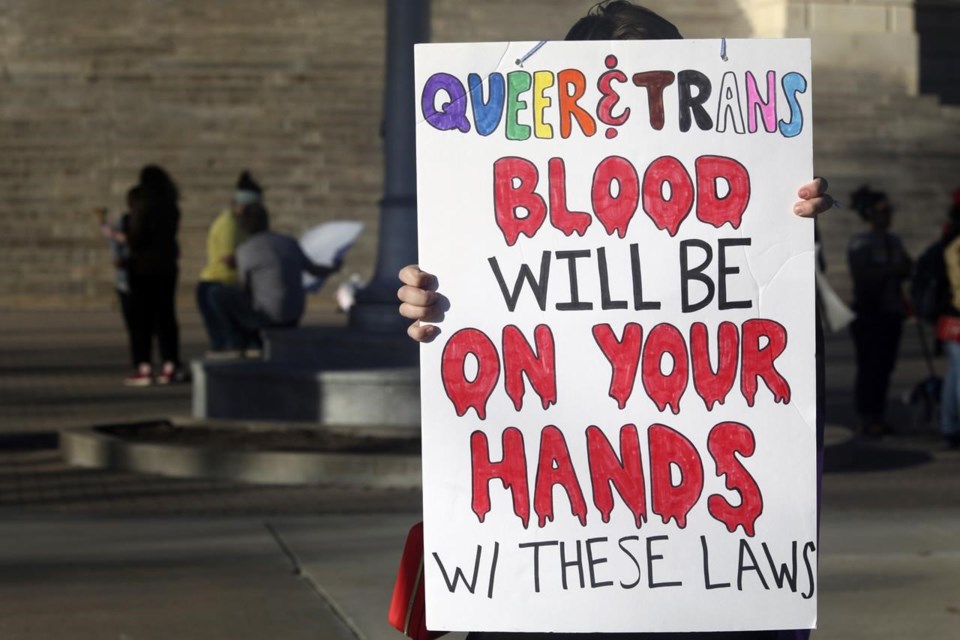Five transgender children and their families sued Texas this week over a law that would bar transgender care for them and other minors, adding more uncertainty to the fate of policies to curtail the rights of transgender people.
Most GOP-controlled states in the past few years have passed similar laws or others that would keep transgender people from using school bathrooms to match their gender identity or to ban them from some sports teams.
Here's a look at recent developments and where laws on transgender issues stand.
BANS ON GENDER-AFFIRMING CARE FOR MINORS FACE THE COURTS
The Texas lawsuit filed Wednesday seeks to put on hold a ban on puberty-blocking drugs, hormone treatment and gender-affirming surgeries for minors that's scheduled to take effect Sept. 1.
The challenge asserts that the law deprives parents of fundamental rights to care for their children, discriminates based on sex and transgender status, and violates the rights of healthcare providers to engage in their occupations.
At least 20 states have limited gender-affirming care for minors; half of those policies are not in effect, primarily because they’re so new they haven’t kicked in yet.
But they're also facing legal challenges. Since June, federal judges in Arkansas, Indiana and Kentucky have put the bans on hold while they consider lawsuits filed by families of transgender children.
So far, only one court has issued a ruling favoring a ban.
The 2-1 decision from the Cincinnati-based Sixth U.S. Circuit Court of Appeals on Saturday allowed enforcement of Tennessee's restrictions to take effect while appeals move ahead. The court said it was aiming to have the case resolved by Sept. 30.
A lower court had put the law on hold last month, just before it was to take effect on July 1. The district judge left in place a ban on gender-affirming surgeries for minors, which are rare. The state government made an emergency appeal.
The ruling means that those under 18 in Tennessee cannot start puberty-blocking drugs or hormone therapies. But under the law, minors already receiving treatments could continue to do so through March 2024.
KANSAS ORDERED TO STOP ALLOWING DRIVER'S LICENSE CHANGES
Kansas must stop allowing transgender people to change the sex listed on their driver's licenses under a pair of state court rulings this week.
The rulings come in a legal dispute between the state's Republican attorney general and Democratic governor on the implications of a new law that took effect this month over the governor's veto. That new law defines a person’s sex as male or female based on the “biological reproductive system” identified at birth, applying that definition to any state law or regulation.
Gov. Laura Kelly had said the state would continue changing driver's licenses so the sex listed would match the identity of transgender people, but Attorney General Kris Kobach sued to stop it.
A judge has twice sided with Kobach. In a ruling Wednesday, she declared that the 172 transgender people who rushed in June to change their licenses while they still could created a “public safety concern.”
The ban on license changes is set to expire on July 24, but Judge Teresa Watson indicated she'll have a heading on whether to extend it past then.
The majority of states allow gender marker changes on driver's licenses and about half do so on birth certificates, too.
The legal battle in Kansas does not address whether changes can be made to birth certificates, which the state has been modifying since settling a lawsuit in 2019.
WISCONSIN SCHOOL'S BATHROOM POLICY HALTED
A federal judge ruled last week that a Wisconsin school district cannot enforce for now a requirement that transgender students use bathrooms and locker rooms that match the sex they were assigned at birth.
The challenge to the policy was filed anonymously by an 11-year-old transgender student and her mother.
The case is not over yet, but the judge indicated that the student's claims would likely prevail in a trial, so the district must stop enforcing its rule while it's decided.
The judge cited a similar Wisconsin case from six years ago that blocked bathroom restrictions.
At least two federal appeals courts have also ruled in favor of transgender students in at least two bathroom cases in recent years.
These legal battles all concern school district policy, but at least nine states are currently enforcing restrictions on which bathrooms transgender students can use.
NORTH CAROLINA OVERRIDES EXPECTED
Lawmakers in North Carolina are expected to vote in the next week or so to override Democratic Gov. Roy Cooper’s vetoes of three measures that would place restrictions on transgender people.
One would bar medical professionals from providing hormone therapy, puberty-blocking drugs and surgical gender-transition procedures to minors starting Aug. 1. Another would restrict transgender students’ participation in school sports. The third would limit classroom discussion on gender identity and sexuality.
All three are versions of bills Republican-controlled states across the U.S. have been adopting lately and at an accelerating pace this year.
At least 22 states have adopted sports restrictions, though enforcement has been put on hold by courts in three of them. At least five have limited teaching on sexuality and gender identity.
One lawmaker’s party change earlier this year gave Republicans a veto-proof majority in North Carolina, paving the way for the state to take policy steps favored by the right. The state has also restricted abortion access.
Geoff Mulvihill, The Associated Press



